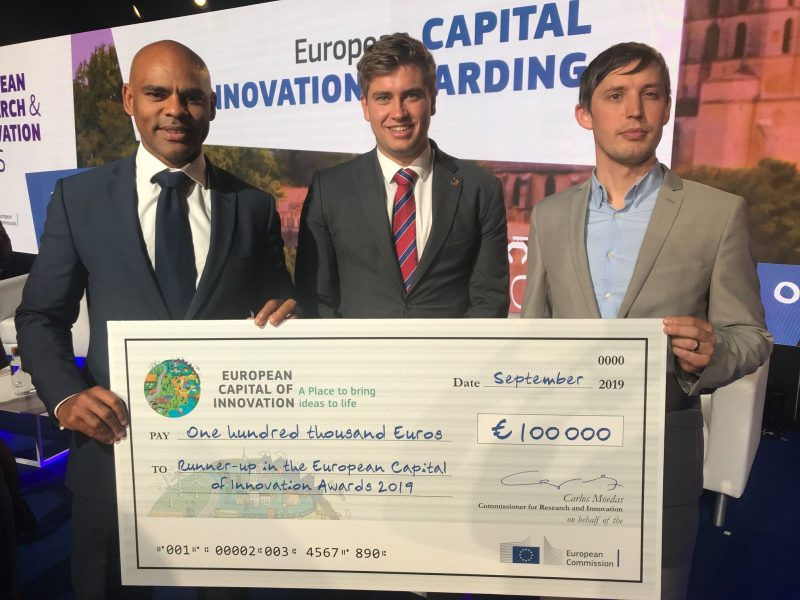On 25 September 2019, the European Commission awarded Bristol €100,000 for its One City approach to improving the fairness, health, and sustainability of the city. Bristol was one of the six cities shortlisted for the grand prize of European City of Innovation 2019 in the European Capital of Innovation (iCapital) Awards.
While Nantes ultimately won the grand prize of €1 million, Bristol earned recognition and a €100,000 reward with its innovative and collaborative One City plan. The plan was a product of public and private organisations coming together to create goals for the betterment of Bristol, which are to be met by 2050.
One City oversaw the launch of seven initiatives to tackle urgent issues Bristol faces:
1. Bristol Housing Festival
The Bristol Housing Festival is a five-year programme dedicated to developing communities that would work as prototypes for large-scale, long-term quality, and affordable housing projects in the city. The programme funds and builds spaces where tried-and-true practices are mixed with brand new solutions to housing. Such ideas are tested in real-world environments.
There are already multiple projects under the banner of the Bristol Housing Festival. LaunchPad was started in March 2019, with the goal of providing modular housing for young independent adults.
A similar concept is being explored with the October 2019 project The Co-Modular Home for apartment homes with a focus on community. BoKlok UK Ltd. will be developing 200 sustainable, low-cost homes in South Bristol.
These are just a few examples of the many more housing projects the British Housing Festival has in development over its five-year run.
2. City Funds
City Funds is an initiative that provides funding and support to organisations that aim to address challenges facing Bristol communities. Inequality is the main problem the initiative seeks to combat. It will do so through investing in four priority areas: access to healthy and affordable food, diverse economic participation and ownership, community resilience, and environmental transformation.
City Funds can offer £50,000 to £1 million, investing money in a variety of methods to maximise the recipients’ chances of succeeding in their projects in the long run.
Planning business support is a core service for City Funds. Entrepreneurs can get financial aid in jumpstarting their ideas through grants and loans to pay for legal advice and pre-planning expenses.
City Funds also plans on giving grants to organisations directly working on the causes and effects of inequality in the city.
3. City Leadership Programme
Promising sixth form students from disadvantaged and under-represented backgrounds can benefit from the City Leadership Programme. The programme invests in such youths with the goal of developing future leaders who will bring a diversity of perspectives to answer social, political, and economic problems.
Students in the first year of sixth form are nominated by teachers, instructors, and youth leaders. Exceptional students from upper sixth and year 11 can also be nominated.
The programme will choose 12 to 14 students to undertake a two-week comprehensive summer course on personal development, academic enrichment, networking, exposure, and skills-building. They will also get a graduation dinner and five months of mentoring from private and public sector leaders. They will then get to enjoy an alumni network of participants and contributors with an annual alumni dinner.
4. Looking After Bristol
Bristol’s children placed in foster care come from various backgrounds and have complex needs. There should be more foster carers that can accommodate such different lived experiences with compassion. The Looking After Bristol campaign was created to find 70 foster carers that could answer that call.
During the beginning of the 2019 campaign, there were 614 children and young people placed under the supervision of 291 foster carers. The addition of 70 new foster carers would allow for more children to be cared for in the city. Such foster carers were sought after to provide the foundational familial needs of children ranging from babies to teenagers.
The eight-week campaign promised to provide support, training, and an allowance to the newly recruited foster carers. It also partnered with businesses through the Foster Friendly Employer policy, which gave flexible working hours and paid time off to foster carers so they could have time for training and welcoming children into their homes.
5. Period Friendly Bristol
Lack of access to sanitary menstrual products and menstrual hygiene education as well as stigma regarding menstruation and periods, is a problem across the country and Bristol is no exception. Period Friendly Bristol was started to end the overall issue of period poverty in the city. Its primary method is establishing a network of donation and distribution points for period products across Bristol, which can be found through the website and app.
The locations marked on the website and app have a Period Friendly Box containing period products that are available for free. Information is also provided regarding where the box is placed in the building, if the premises are wheelchair-accessible, if there are toilets, and what the operating hours are. Businesses can support the campaign by hosting a donation box.
Period Friendly Bristol is also developing a menstruation education programme for all secondary schools in Bristol. It will tackle the entire menstrual cycle, menstrual pain, and environmental issues. Better education for boys on the subject is another specific goal.
6. Bristol Equality Charter
The Bristol Equality Charter was designed by private, public, and voluntary organisations along with the Bristol City Council to promote principles of diversity, equality, and inclusion in the city. The charter sets to make everyone feel included and is given equal opportunity to succeed and contribute to the city’s development.
Signatories of the Bristol Equality Charter make a statement aligning themselves with the charter’s goals, with the promise of taking specific actions. These include recognising, supporting, and empowering those responsible for promoting equality in their organisations as well as addressing allegations of discrimination, harassment, bullying, and victimisation in an effective and timely manner.
Organisations and individuals can sign the Bristol Equality Charter. They are free to set their own priorities and goals for improvement, as long as they stay true to the spirit of the charter.
7. Reviewing Bristol’s Sustainable Development Goals
The United Nations has set 17 Sustainable Development Goals (SDGs) for all nations to achieve economic, ecologic, and social sustainability by 2030.
Bristol has committed to accomplishing each SDG on a local level via the One City plan. In July 2019, the Cabot Institute for the Environment at the University of Bristol published the UK’s first Voluntary Local Review (VLR) on how the city has been actively pursuing the SDGs.
The VLR presents information on the sustainability activities of 90 Bristol-based organisations. It marks the progress made on meeting the UN’s 17 SDGs, including data on over 140 indicators.
Building a Better Bristol
Bristol has proven to be exemplary in solving local issues, improving sustainability, and reinforcing its residents’ roles in advancing communities. €100,000 and international attention can only spur the city to do even better in the future, from smart city innovations using the latest IT solutions to social progress.
If you want your organisation to keep up with Bristol’s One city approach, you need a leading IT support in Bristol. Give our professional IT team a call at 0117 369 4335 and we’ll discuss your needs and what we can do to empower and help your business.
Image source: Bristol One City
ALL ARTICLES
